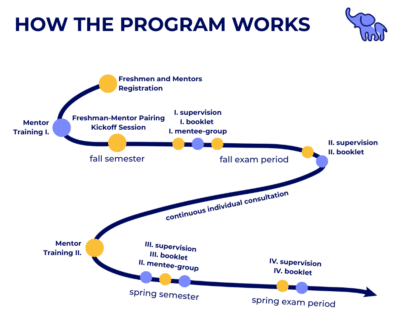The International Students Mentoring Program at Semmelweis University’s Medicine Faculty aims to provide comprehensive support and guidance to incoming students, particularly international students, throughout their academic journey. By fostering mentor-mentee relationships, the program seeks to enhance student success and facilitate a smooth transition into university life.

Mentors apply to the program by sending a motivational letter and a CV. After the application, they must participate in an interview.
Once admitted to the program, the Mentor-Mentee pairs are created according to their traits, preferences and backgrounds to make a close cooperation. Mentors are trained by the programme’s organizers and professionals working at the Institute of Behavioural Sciences.
This is complemented by two lectures in which, the Mentors:
- get to know their tasks in more detail, and the expectations towards them as Mentors
- learn the basics of peer support and non-directive advising, with a marked emphasis on the hardships international students face,
- learn about their competencies and boundaries,
- get informed about the administrative requirements and resources
- deepen their knowledge about study techniques including theoretical basics of psychological support and learning methods
- get training to recognize situations when their Mentees need psychological help and where to refer them in such cases.
We need to focus on this area, since the challenges medical students face put significant amount of stress on them (especially in the first year). In addition, being an international student makes the whole situation even more demanding. In the program, we aim to identify cases where peer support is insufficient and provide professional assistance from the Student Counselling, the Psychosomatic Outpatient Department, and the Department of Psychiatry and Psychotherapy. These three institutions cover a three-step mental health service.
Mentors are obliged to give feedback on their work and activities in the form of logbooks and they have the opportunity to share their concerns, difficulties, or remarks during the mandatory supervision sessions. These small-group sessions facilitate the improvement of skills that can be used both professionally and personally and provide an opportunity to learn ones that are not necessarily covered by mandatory courses. The Mentor’s work is honoured with 2 credits per semester.
Mentees are expected to provide feedback by filling out forms and questionnaires regularly. This will help us to further improve the mentoring experience and conduct research.
In addition to their obligations in the program, we provide opportunities for Mentors and Mentees to socialize, network, and meet with the Hungarian members of the program. These occasions can contribute to the easier integration of international students and widen their social connections.